Experts predict that up to 1.5 million barrels per day could be eliminated in Europe by 2030, radically transforming the refining sector.
Energy Transition and Capacity Reduction
The golden era of European refining is coming to an end as companies face a major transformation due to the energy transition.
Demand for fossil fuels is gradually declining, driven by the rise of electric vehicles and policies to reduce CO2 emissions.
The International Energy Agency (IEA) predicts that 1 to 1.5 million barrels per day (b/d) of refining capacity in Europe could be shut down by 2030, well above the average annual shutdowns of 220,000 b/d observed to date.
Closures and Conversions in progress
Recent announcements of refinery closures in Germany, Italy and the UK demonstrate the trend.
Shell plans to cease crude processing at its Wesseling site by 2025, while BP is reducing its capacity at Gelsenkirchen by a third.
In Italy, the Livorno refinery has suspended operations, and the Grangemouth refinery in the UK may also close.
These initial announcements mark the beginning of a wider transformation, as refiners adapt their business models to new market realities.
Declining Margins and New Challenges
The war in Ukraine temporarily delayed refinery closures, boosting margins.
However, margins have now returned to more normal levels.
According to S&P Global Commodity Insights, ultra-low sulfur diesel (ULSD) margins in Northwest Europe, which peaked at $42/b in 2022, have fallen to $29.71/b in 2023.
In the long term, margins should continue to decline, with demand for diesel and gasoline falling as early as 2025.
Adjustment strategies and future prospects
Faced with this decline in margins, many refiners are choosing to close down their sites in Europe and concentrate on other regions.
ExxonMobil has cut its Western European capacity by a third since 2000, while Shell aims to have just two refineries left in Europe, focusing on North America and China.
According to forecasts, refinery utilization rates in North-Western Europe could fall from 84% in 2024 to 81% in 2027, leading to accelerated closures between 2029 and 2030.
Conversions to Biofuels
Some refiners see a long-term opportunity in converting their facilities into biofuel production sites or integrating them with petrochemical facilities.
The Livorno refinery in Italy and the La Mède and Grandpuits refineries in France are examples of this trend.
However, the profitability of these projects remains uncertain, depending heavily on government policies to stimulate demand and investment in this nascent sector.
The European refining industry is heading for a profound transformation, driven by the pressures of energy transition and global competition.
Refinery closures and conversions mark a historic turning point, requiring strategic adaptation to survive and thrive in a future where clean energy will dominate.





















